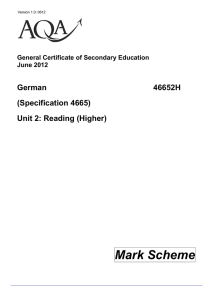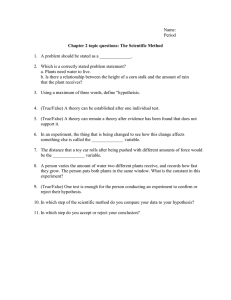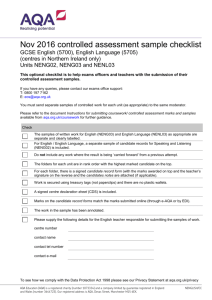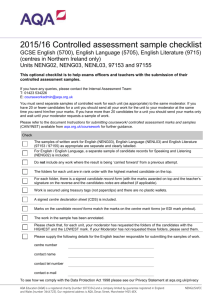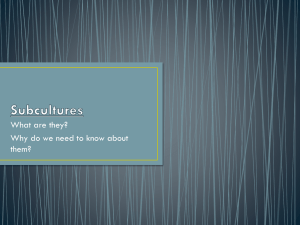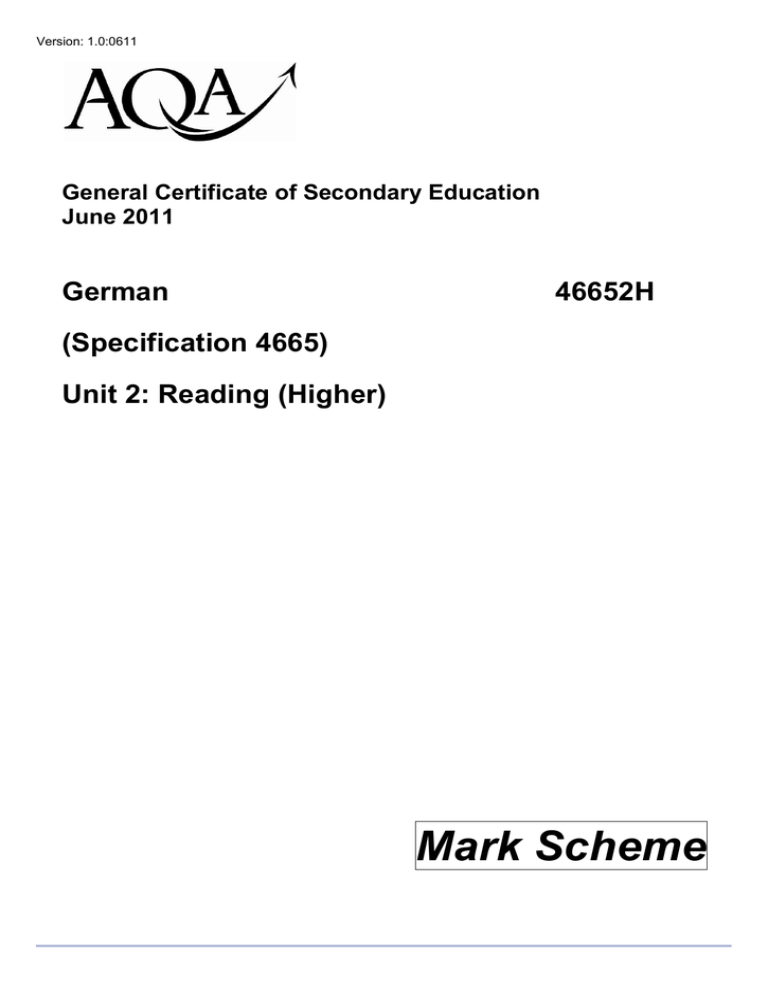
Version: 1.0:0611
General Certificate of Secondary Education
June 2011
German
46652H
(Specification 4665)
Unit 2: Reading (Higher)
Mark Scheme
Mark schemes are prepared by the Principal Examiner and considered, together with the relevant
questions, by a panel of subject teachers. This mark scheme includes any amendments made at the
standardisation events which all examiners participate in and is the scheme which was used by them
in this examination. The standardisation process ensures that the mark scheme covers the
candidates’ responses to questions and that every examiner understands and applies it in the same
correct way. As preparation for standardisation each examiner analyses a number of candidates’
scripts: alternative answers not already covered by the mark scheme are discussed and legislated for.
If, after the standardisation process, examiners encounter unusual answers which have not been
raised they are required to refer these to the Principal Examiner.
It must be stressed that a mark scheme is a working document, in many cases further developed and
expanded on the basis of candidates’ reactions to a particular paper. Assumptions about future mark
schemes on the basis of one year’s document should be avoided; whilst the guiding principles of
assessment remain constant, details will change, depending on the content of a particular examination
paper.
Further copies of this Mark Scheme are available from: aqa.org.uk
Copyright © 2011 AQA and its licensors. All rights reserved.
Copyright
AQA retains the copyright on all its publications. However, registered centres for AQA are permitted to copy material from this
booklet for their own internal use, with the following important exception: AQA cannot give permission to centres to photocopy
any material that is acknowledged to a third party even for internal use within the centre.
Set and published by the Assessment and Qualifications Alliance.
The Assessment and Qualifications Alliance (AQA) is a company limited by guarantee registered in England and Wales (company number 3644723) and a registered
charity (registered charity number 1073334).
Registered address: AQA, Devas Street, Manchester M15 6EX.
Mark Scheme – General Certificate of Secondary Education German – 46652H – June 2011
READING TESTS
Notes on the Marking Scheme
Non-verbal Answers
Follow the mark scheme as set out.
Verbal Answers
1.
The basic principle of assessment is that candidates should gain credit for what they
know, understand and can do. The following guidance should be borne in mind when
marking.
(a)
Credit should be given for all answers which convey the key idea required
intelligibly and without ambiguity. A separate assessment of spelling, punctuation
and grammar is not required on these papers because of the nature of the
answers. However, these aspects are an integral part of assessing
communication and marks cannot be awarded where errors in spelling,
punctuation or grammar lead to a failure to communicate the required information
without ambiguity.
(b)
Where a candidate has given alternatives or additional information in an answer,
the following criteria should be applied:
-
if the alternative/addition does not contradict the key idea or make it
ambiguous, accept;
if the alternative/addition contradicts the key idea or makes it ambiguous,
reject.
(c)
Where numbered lines are given within a question/section of a question, credit
should be given for correct answers, no matter which line they appear on.
(d)
Where a question has more than one section, a candidate may include as part of
the answer to one section the information required to answer another section. For
instance, the information required to answer section (b) might be given as part of
the answer to section (a). In such cases, credit should be given for having
answered section (b), provided that no incorrect answer has been given for that
section in the correct place.
(e)
Where a question or part of a question carries more than one mark, candidates
are given credit for all the correct answers they give, even if they have given
incorrect answers as well, except where any of the latter contradicts a correct
answer that they have given.
2.
...../..... means that these are acceptable alternative answers. (.....) means that this
information is not needed for full marks.
3.
In questions where candidates are asked to name, for example, three types of vegetable
sold in the market, only the first three items they write down should be considered.
4.
Accept
-
5.
T/F/?
/X/?
a mix and match approach using the above, where the response is clear and
unambiguous (eg. T and are both used by the candidate).
In multiple choice questions where candidates must choose one letter or number, they
should automatically get no mark awarded if they give more than one. If the rubric
instructs them to write one letter or number in the box and they do so, but write a second
letter or number outside the box too, then the answer in the box should be considered.
3
Mark Scheme – General Certificate of Secondary Education German – 46652H – June 2011
6.
No mark scheme can cover all possible answers. When in doubt:
-
look for the key idea, where this is appropriate.
-
NFP = no further penalty
7.
Where a candidate has crossed out an answer and what was underneath remains legible
then it should be assessed. Where part of an answer is crossed out then only what
remains should be considered.
8.
Where a candidate spells the answer in such a way that it is a word in the target
language, no credit can be awarded.
9.
If a candidate offers two different responses in English or in the target language eg dog
(cat) or dog (Katze) where the answer is dog, no credit can be awarded.
4
Mark Scheme – General Certificate of Secondary Education German – 46652H – June 2011
GCSE Reading – Higher Tier
Question
Accept
Mark
Notes
1 (a)
Going to university (in October)
/ Money for uni / to pay for uni /
So he can afford to go to uni /
for university
1
Reject: university
(alone)
Question
Accept
Mark
Notes
Work in the garden /gardening /
gardener / garden (verb)
1
1 (b)
One of:
Go shopping /shopping
Question
1(c)
Work in a shop
Accept
Mark
Work with children / kids
1
Eg anything to do with children
1 (d)
Accept
Mark
Question
2 (b)
Notes
Reject: flexible
1
Good natured / good tempered /
good humoured / good
personality
2 (a)
Reject: work in a
nursery
One of:
Hard working/good
worker/efficient
Question
Notes
Reject specific
activities eg
babysit; childmind; look after
children
Must be a global answer
Question
Reject:
Accept
Mark
C and F (any order)
Reject: has good
moods; happy;
good laugh; kind
Notes
2
Accept
Mark
A and E (any order)
2
5
Notes
Mark Scheme – General Certificate of Secondary Education German – 46652H – June 2011
Question
3 (a)
Accept
Christian
Question
3 (b)
Hanna:
B
Josef:
A
Mark
1
Mark
2
Mark
There is one mark for each
correct answer.
5 (a)
Accept either
upper or lower
case letters, or a
mixture of both
Notes
(By printing) brochure/leaflet on
cheap (cheaper; cheapest)
paper
1
Reject: recycled
paper; also cheap,
recycled paper
(i.e. both in one
answer)
Accept
Mark
Notes
Not to take more than one
(brochure) per family
Question
5 (c) (i)
4
Notes
Mark
Question
5 (b)
Notes
2
H F B A (in that order)
Accept
Notes
2
Accept
Question
Notes
2
Accept
Question
4
5
Accept
Question
3 (c)
E
Mark
1
Accept
Mark
One of:
Only turn tap on when you need
water / Only use water when
you need it
1
Have a shower instead of a
bath / to save water
6
Reject: show to /
share with others
Notes
Mark Scheme – General Certificate of Secondary Education German – 46652H – June 2011
Question
5 (c) (ii)
Accept
Mark
Use them more than once/reuse
1
Accept
Mark
5 (c) (iii)
Dispose of them properly / Take
them home with you
1
Question
Accept
Mark
T
Question
6 (b)
6 (c)
6 (d)
Reject: recycle
Notes
Notes
1
Accept
Mark
A
Notes
1
Accept
Mark
M
Question
6 (e)
Mark
S
Question
Notes
1
Accept
Question
Reject: recycle;
Use a single bag
Question
6 (a)
Notes
Notes
1
Accept
Mark
S
Notes
1
Question
Accept
7 (a)
Three nationalities / seven
passports / two religions / three
/ four languages in one family
Mark
1
(Accept either ‘three’ or ‘four
languages’; both not needed)
7
Notes
Accept: A mixture
of nationalities /
come from
different countries
Mark Scheme – General Certificate of Secondary Education German – 46652H – June 2011
Question
7 (b)
Accept
When they don’t want the
children to understand / When
the children should not hear
them
Question
7 (c)
Mark
Notes
1
Accept
Mark
Notes
Two of:
Next holiday
2
Mother’s (possible)
unemployment
Who’s boss (at home)
Question
7 (d)
Accept
Mark
Notes
One of:
They get on well
The family ‘works’
1
They have a humorous
relationship
They treat each other with
respect
Question
7 (e)
Reject: the family
is functional
Reject: respectful
Accept
Mark
Notes
Reject: … member
of all religions
One of:
The children are members of
both religions
1
They keep the feast days of
both religions
Question
7 (f)
Accept
Mark
If society was like this family
there would be no problems
Notes/Reject
Any answers from
(d)
[Answer needs to imply transfer
of this family’s relationship to
society at large]
1
Accept ‘when’ for ‘if’
8
Mark Scheme – General Certificate of Secondary Education German – 46652H – June 2011
Question
8
Accept
Mark
Notes
C D G H (any order)
4
One mark for each correct
answer.
Question
Accept
Mark
Notes
9 (a)
She completed her first book in
two months
1
Accept ‘for a year’
for jahrelang in
OCR
Accept
Mark
Notes
Question
9 (b)
3–2–1
Question
9 (c)
1
Accept
Mark
15 minutes
Notes
1
Question
Accept
Mark
9 (d)
Either: Wanted time to write /
concentrate on her writing / had
no time to write
1
Notes
Or: Wanted to work for herself /
wanted to be self-employed
Question
9 (e)
Accept
Write for 2 – 3 hours in the
evening / write only in the
evening
Question
9 (f)
Mark
1
Accept
Notes
Reject: night /
afternoon
Mark
Notes
1
Reject: in the
middle of the night
One of:
She comes home after/at
midnight
She has to work through the
evening / work late
Higher Paper Total = 45 Marks
9
Mark Scheme – General Certificate of Secondary Education German – 46652H – June 2011
Mark Ranges and Award of Grades
Grade boundaries and cumulative percentage grades are available on the Results statistics
page of the AQA Website.
Convert raw or scaled marks into marks on the Uniform Mark Scale (UMS) by using the
link below.
UMS conversion calculator www.aqa.org.uk/umsconversion
10

